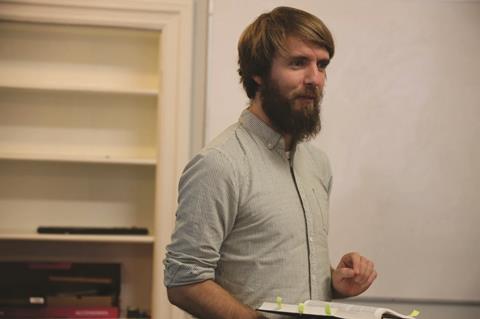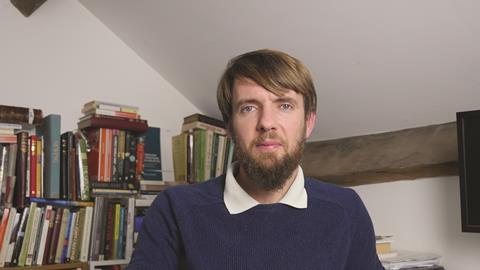The former theology lecturer on why he still stands by the viral social media post that cost him his job
UPDATE 01/08/24 An Emplyment tribunal has dismissed all of the claims made by Dr Aaron Edwards against his former employer, Cliff College. In a statement the college said, “While this is not a course of action that we would have chosen, we are pleased with the Tribunal’s unanimous judgment that has dismissed all of the claims made by Dr Edwards. Throughout this process, we have chosen not to engage publicly with the many claims that have been made and broadcast in public media. These claims have now been shown to be unfounded, and the College, by contrast, has been judged reasonable and proportionate in its actions. We wish Dr Edwards and his family well for the future, as we all move on from this long and involved process.”
Dr Aaron Edwards says he will appeal the ruling. In a statement released by Christian Concern, he said, “I am very surprised at the judgment. I believe ours was an extremely strong case and was very well supported by the Christian Legal Centre.”
This is a story about 47 words that changed Dr Aaron Edwards’ life and career, potentially forever: “Homosexuality is invading the Church. Evangelicals no longer see the severity of this [because] they’re busy apologising for their apparently barbaric homophobia, whether or not it’s true. This *is* a ‘Gospel issue’, by the way. If sin is no longer sin, we no longer need a Saviour.”
The offending post on Twitter (now X) went viral within minutes, with many Christians calling for Dr Edwards to remove it and apologise. Among those who objected were his employers, a Methodist Bible college, who told the lecturer to take it down. When he refused, he was suspended and ultimately sacked.
Now, one year on from the viral tweet that changed everything, Dr Edwards is taking Cliff College to an employment tribunal on the grounds of unfair dismissal. He – and his supporters at Christian Concern – will argue that it was wrong for a theological college to fire a lecturer for articulating a biblical sexual ethic.
The case raises vital questions that go far beyond LGBT issues: Is it true, as Dr Edwards alleges, that “leftward drift” is happening among our Christian institutions? Is it always wrong for Christians to cause offence, or do we need to become more comfortable with saying the unsayable? Alternatively, does this case merely hinge around poor judgement and a lack of wisdom on the part of Edwards? And is he going against Paul’s instruction in the New Testament to not take another brother to court?
Dr Edwards describes himself as “shamelessly biblical” and an “academic in exile”. Despite the acrimony his case has caused, and his continued wading into contentious subjects online, he is nothing but polite throughout our lengthy interview. He even assures me he is a defender of nuance – although if your opinion of Dr Edwards is formed through reading his online posts, ‘nuanced’ might not be the first word you’d use to describe him.
What made you join Twitter?
It was in the aftermath of 2020. I was disappointed with the response of many evangelical leaders and churches to the ramping up of pressure against Christians in culture. When a lot of these issues were coming out during Covid – critical race theory and the LGBT agenda – I started to realise there was a need to engage with the topics that are attacking the Church.
What was the context of your tweet?
The Church of England was having discussions around blessing same-sex relationships and same-sex marriage.
I was hearing bishops who were formally evangelicals suddenly saying “we’re so sorry” and publishing treaties on why they were apologising to the LGBT community. By all means, we should repent of evil and discrimination against people. But I don’t think you should be apologising when you’re just upholding God’s word. I felt like a stand was needed.
I describe myself as ‘shamelessly biblical’
Your language of homosexuality “invading” the Church was especially incendiary. What did you mean by that term?
For me, the language of invading is entirely appropriate for when something has come from outside of a particular domain. We have the Church, or the kingdom of God, and then we have a secular idea that’s averse to God’s kingdom and his ways. Homosexuality, for me, doesn’t originate from within the kingdom of God.
For many people, homosexuality is part of their identity. When they hear you say: “homosexuality is invading the Church” they interpret that as a personal attack. Can you see why that’s offensive?
I knew that, of course, its possible people might be offended. But it’s not the kind of offence that I think is outside the bounds of legitimate Christian proclamation on these key issues. Our reticence to say it is part of the problem.
Today, we assume that to cause offence is unchristian, but that’s quite obviously nonsense. There are good kinds of offence and bad kinds of offence. What’s the purpose – are you saying something that can be defended from the word of God? I believe I can defend the offence caused by that post.

Many Christians called for you to remove the post. How did that affect you?
It was stressful. The tweet was sent on Sunday morning. When I saw it had blown up by Sunday afternoon, I added some clarifications. But the college had already denounced me, saying it was an inappropriate and unacceptable use of language. That was hurtful because there was no legitimate attempt made to contact me. They sent an email to my work account, which I wouldn’t check on a Sunday. The email said: “We want you to take this down at the first opportunity and have a conversation.”
I went to a prayer meeting at my church that evening. Someone approached me with a prophetic word and said that God was calling me to a new season of ministry and gave me an envelope with money in. They said: “God wants to bless you.” I assumed he knew about this issue but he didn’t – he didn’t even know what Twitter was! – so that was a real encouragement. As I came home from that meeting, I was in tears listening to worship music in the car, praying, realising this was a really big moment.
I don’t blast in telling everyone they’re going to hell, but I’d be willing to
My wife was really upset. She said: “Couldn’t you’ve worded it slightly differently?” I said: “I don’t feel I could. I felt I was doing what God had put in my heart to do.” Now I had this envelope, I felt God was going to take care of us. Whatever happened, we could trust him. It didn’t take away the stress, but it was a real comfort.
The next day I came into the office, read the email and replied, saying: “I can’t take the tweet down in good conscience. It’s not fair of you to ask me to. I’d love to have a conversation and we can talk it through.” When we met that afternoon, the very first sentence I heard was: “This is not a conversation. I’m going to read your suspension letter and you have half an hour to clear your desk.”
I thought, with all the bureaucratic processes, it would be hard to fire someone over something like this. But I had a disciplinary hearing, which was very biased, and they suggested my one tweet and my refusal to take it down would lose the college money.
Cliff said you were bringing the college into disrepute. What happened next?
I was fired. With this sense that God wanted me to go into a new season, I created a crowdfunding campaign. The same day, I received a letter of eviction for the house we were renting near the college. So we were in a really hard situation, knowing we’d have to move out and I didn’t have a job. Thankfully, lots of people gave to the crowdfunder, which gave us money to live on.
Why didn’t you look for work at another theological college more aligned with your beliefs?
I describe myself as “shamelessly biblical”. Christians in the West are going to be shamed for what were previously seen as good, moral beliefs. They’re now called bad beliefs. But rather than us being ashamed, I believe we should live shamelessly. We should say: “This is what the Bible says and I’m gonna say it how the Bible says it. You’re going to call me names, but this is what Christians throughout the ages have done – they’ve flown the flag.” I don’t see that happening in the current academic system.
The leftward drift in all theological colleges has been evident for many years. There’s a few good outliers left. But even the solidly evangelical ones wouldn’t condone my going on the offensive. I think we need theological education [that is] genuinely not scared of teaching on certain issues – with nuance.
From looking at your social media, I would say your content is not particularly nuanced…is that fair?
We think nuance always means presenting two sides. But historically preachers have needed to exclaim things. I think we’ve probably elevated the question mark at the expense of exclamation marks.
What do you make of Peter’s command to share your faith with “gentleness and respect” (1 Peter 3:15)? I don’t think LGBT people would describe your tweet as gentle or respectful.
Do you think the apostles are always gentle and respectful in the way that you might expect them to be? Peter says to the Jews at Pentecost: “You killed the Messiah” [Acts 2:23].
If you observed Jesus turning over tables in the temple or Paul at Ephesus when he’s causing a riot, you would not say that’s nuanced.
I think the apostles show us a way of engaging with extremely anti-Christian worldviews. They don’t shirk back from what they need to say.
In 1 Peter 3:15, he’s talking about someone asking: “What is the hope?” and you giving an answer, which is slightly different to preaching in the town square or going into a synagogue where you’re clearly going to cause some upset.
Do you think the Church is ducking the harder teachings of scripture?
Yes. The proclivity of the human heart is to want to be liked. So we say: “God loves you.” That’s great, but you need to put a bit more meat on that bone. God loves you so much that he’s willing to die for your sin, and he has wrath, which he’s pouring out upon sin. You’re not going to hear that on an Alpha Course, for example, where we’re trying to be winsome and persuade, which is an important thing to do. But it has become over-elevated, particularly among middle classes, and so we’ve failed to reach swathes of working classes across Western society, because we haven’t been speaking plainly.
But isn’t the winsome approach a good example of doing evangelism in our context? Paul said he became all things to all men that he might win some (1 Corinthians 9:19). In order to reach many in the secular West, isn’t a ‘gentleness and respect’ approach a better strategy?
People think it works, because it’s probably how they came into the Church. It worked for a previous era, but we’ve now moved into an era where you don’t have positive social cachet for being a Christian. We are in an environment which is genuinely hostile to Christianity. You’re not in a neutral sphere. When they find out what you really believe and what’s really in that book, they’re not going to like you. I often think if every MP in the House of Commons read the Bible, they might reconsider Gift Aid [which allows churches to claim tax back on donations received] – because there’s too much in the Bible which is not in line with what we now call ‘British Values’.
I don’t blast in telling everyone they’re going to hell every moment, but I’d be willing to. I think you need to be willing to say what needs to be said.
On the one hand, you’re saying compromise is wrong. On the other, for many years you happily lectured at a college that’s part of a denomination (Methodism) which permits same-sex marriage. Isn’t that a contradiction?
Yeah, that’s [a] good question. Most Christians work for organisations that don’t share all of their values. I didn’t see Cliff College as a church but as a theological education institution.
But it’s a Christian Bible college, isn’t it?
I would have called it a Christian Bible college, in the sense that it reflects a Christian ethos.
So you still believed Cliff reflected a Christian ethos, even while part of a system that permitted same-sex marriage?
A fallible and imperfect one. One in need of reform. I was actively seeking to bring reform.
Why have you decided to take legal action against the college?
I had to wrestle through whether I wanted to do that. I was persuaded it would be good to set a precedent and to encourage others in similar situations.
Doesn’t Paul teach Christians should not take other believers to court (1 Corinthians 6)?
I think when Paul says: “brother should not take brother to court” he’s talking about the local church. You didn’t pay my invoice, or I don’t like what you said to me at coffee time so I’m going to take you to court. That kind of thing is not a good witness to the world.
But a Christian lecturer taking a Christian college to court isn’t a good witness either, is it?
In many ways, it could be a bolder witness, because people can say: “There’s a Christian who actually stands on what they believe”, whereas the college is not standing on historic Christian beliefs.
That’s assuming people take your side. Paul says: “Is it possible that no one among you is wise enough to judge matters between believers? Instead, one believer goes to court against another. And this happens in front of unbelievers!” (1 Corinthians 6:5-6, NIRV). To me, Paul sounds incredulous that Christians would allow unbelievers to judge between them.
We’re dealing with an employment issue, which is different to what Paul was talking about.
If you’re under contract, you’re already in a legally bound situation. So Cliff has already gone to law, as it were.
But most importantly, in that [same chapter, Paul says]: “Do you not know that wrongdoers will not inherit the kingdom of God? Do not be deceived: neither the sexually immoral nor idolaters nor adulterers nor men who have sex with men” (v9). So literally: “Why go to people who practise homosexuality as though they can judge better?” What do you do when the Church is persecuting the people who say homosexuality is wrong? Paul would be on my side!
Are there no trusted Christian leaders or mediators who could help you and Cliff come to an arrangement that avoids a legal route?
I actually did try to resolve it in-house. I said: “I’d like to have a conversation.” But they decided to suspend me and fire me. They made that choice. I’m just challenging it.
What’s the best outcome for you at this tribunal?
That’s a good question.
It’s not about whether we win a certain amount of money. It’s whether we are able to show that what the college did was wrong and, therefore, that other people in similar situations will be able to share the convictions that are genuinely deeply held and need to be expressed.
Cliff College were given sight of this interview prior to publication, and offered an opportunity to respond to the claims made. They declined to comment, citing ongoing litigation.
To hear the full interview listen to Premier Christian Radio at 8pm on Saturday 4 May or download ‘The Profile’ podcast







































5 Readers' comments